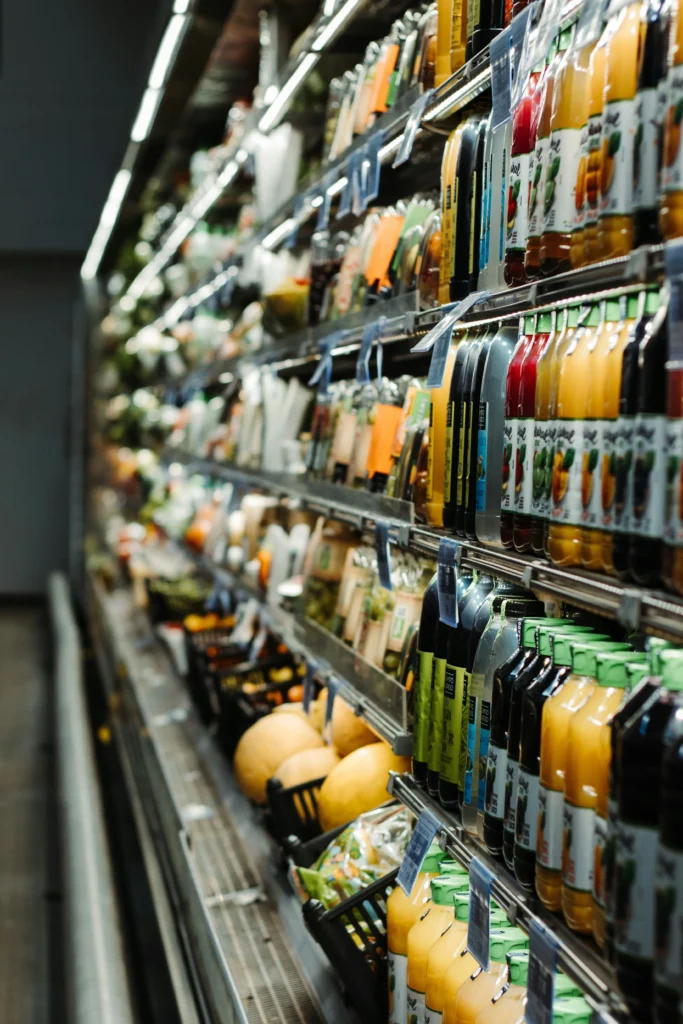Introduction to the Belgian Supermarket Landscape
Belgium boasts a diverse and competitive retail market, with supermarkets playing a pivotal role in the daily lives of its citizens. The convenience and accessibility of supermarkets have made them an essential part of the consumer experience, providing a wide range of products that cater to varying needs and preferences. In recent years, shopping habits in Belgium have evolved significantly, influenced by factors such as health and wellness trends, technology integration, and changing consumer behaviors.
The Belgian supermarket sector is characterized by an array of prominent chains, each vying for market share while striving to meet the unique demands of their customers. Supermarkets have adapted to the growing trend of online shopping, offering home delivery and click-and-collect options, thereby enhancing customer convenience. Additionally, many supermarkets are responding to the increasing consumer awareness surrounding sustainability by emphasizing eco-friendly products and local sourcing in their offerings.
Moreover, the competitive nature of the grocery sector in Belgium compels supermarkets to continuously innovate their marketing strategies, product selections, and customer services. This dynamic landscape encourages retailers to not only focus on pricing but also to enhance the shopping experience, which includes engaging promotional campaigns, loyalty programs, and personalized marketing initiatives. Such tactics ultimately aim to foster customer loyalty and retention within an ever-discerning consumer base.
The objective of this blog post is to provide a comprehensive ranking of the top supermarket chains in Belgium, offering insights into their market positions and how they cater to the diverse needs of Belgian shoppers. By examining these supermarket chains through various lenses, including sales performance, customer satisfaction, and operational strategies, we aim to shed light on the current state of the grocery retail market in Belgium.
Methodology for Ranking Supermarkets
To create a comprehensive ranking of the top supermarket chains in Belgium, a multifaceted approach was employed, focusing on various criteria that accurately reflect their performance and market standing. The primary factors considered in this evaluation include market share, customer satisfaction, store locations, product variety, pricing strategies, and online presence. Each of these elements plays a crucial role in determining the overall ranking of the supermarket chains.
Market share serves as a vital metric in assessing the strength of a supermarket chain. It represents the proportion of sales within the retail grocery sector, providing insight into the chain’s popularity among consumers. Customer satisfaction was measured through surveys and feedback forms, analyzing the consumer experience, which encompasses aspects such as staff behavior, store cleanliness, and product availability. This enables an understanding of how well each supermarket meets the expectations of its customers.
Store locations were evaluated to ascertain accessibility and convenience for shoppers. A greater density of stores often correlates with ease of access and customer preference, thereby influencing shopping habits. Additionally, product variety is essential; stores that offer a broader range of products, including local and organic options, tend to satisfy diverse consumer needs, positively impacting their ranking.
Pricing analysis focused on affordability, examining promotional offers, loyalty programs, and general price competitiveness among chains. Lastly, the online presence of supermarkets, including website performance and delivery options, has grown increasingly important in the digital age, reflecting the changing preferences of consumers towards online grocery shopping. Data for this ranking was sourced from reputable industry reports, consumer surveys, and market analysis, ensuring transparency and credibility in the final outcomes.
Top 10 Supermarket Chains in Belgium
Belgium is known for its diverse range of supermarket chains that cater to various consumer needs. In this section, we provide a structured comparison of the top 10 supermarket chains operating in the country. The table below highlights each supermarket’s name, market share percentage, number of stores, notable services offered, and customer ratings, offering readers an insightful overview of the retail landscape.
| Supermarket Name | Market Share (%) | Number of Stores | Notable Services | Customer Ratings |
|---|---|---|---|---|
| Colruyt | 29.1 | 300 | Discount prices, self-service checkouts | 4.5/5 |
| Carrefour | 24.8 | 400 | Online shopping, loyalty card program | 4.2/5 |
| Aldi | 10.5 | 400 | Private label products, minimalistic stores | 4.3/5 |
| Lidl | 10.2 | 200 | Weekly specials, bakery section | 4.4/5 |
| Delhaize | 9.0 | 700 | Organic products, tele-shopping | 4.6/5 |
| Intermarché | 5.5 | 200 | Fresh produce, loyalty benefits | 4.1/5 |
| Match | 3.3 | 150 | Themed promotions, convenient locations | 4.0/5 |
| Bio-Planet | 1.5 | 50 | Focus on organic products, local sourcing | 4.8/5 |
| Maxi Zoo | 0.8 | 60 | Pet supplies, grooming services | 4.5/5 |
| Okay | 0.2 | 100 | Convenience stores, fresh foods | 4.2/5 |
This table encapsulates key information on the leading supermarket chains in Belgium, making it easy for shoppers to discern which chains may best meet their preferences and requirements. The listed supermarkets not only vary in their market share and store numbers but also offer a unique range of services, allowing consumers to make informed decisions based on their shopping habits and priorities.
Detailed Analysis of Each Supermarket
Belgium, known for its rich cultural heritage and culinary delights, boasts a diverse range of supermarket chains that cater to varying consumer needs. Each major chain in Belgium has its distinct history, growth trajectory, and unique selling propositions. Here, we detail the top ten supermarkets, offering insights into their market strategies and the challenges they encounter.
The largest supermarket chain in Belgium, Colruyt, was established in 1928. Known for its cost-effectiveness and focus on low prices, Colruyt has successfully expanded its reach across the country. This supermarket’s parallel emphasis on sustainability and local sourcing stands out as a key selling proposition. However, it faces stiff competition from discount chains that threaten profit margins.
Next, we have Delhaize, founded in 1867. Delhaize is often celebrated for its premium product offerings and commitment to quality. Over the years, it has strategically aligned itself with health-conscious consumers by providing organic and locally produced goods. Despite its strong brand identity, Delhaize has struggled with digitization in an increasingly online shopping environment.
Aldi, a formidable player since entering Belgium in the late 2000s, employs a no-frills approach that appeals to budget-conscious shoppers. Its rapid expansion showcases its commitment to growth. Nevertheless, Aldi occasionally faces challenges related to consumer perception regarding product quality compared to competitors like Lidl.
Lidl, known for its aggressive pricing strategies, has also seen remarkable growth since its inception in the local market. With a focus on private label products, Lidl attracts a diverse consumer base. However, the chain must continually adapt to shifts in consumer preferences and trends towards more sustainable practices.
Other notable mentions include but are not limited to Carrefour and Spar, each emerging with their own unique challenges and growth paths as they adapt to market dynamics. A thorough evaluation of these leaders unveils the underlying strategies they employ and the trends that shape their operational landscapes.

The Role of Online Shopping in Belgium’s Supermarket Chains
The evolution of e-commerce has profoundly influenced the supermarket industry in Belgium, particularly highlighted by the surge in online grocery shopping in the wake of the COVID-19 pandemic. As consumers have increasingly embraced the convenience of online shopping, Belgian supermarket chains have recognized the necessity to adapt their business strategies to cater to this new demand. The notable shift to digital platforms is now a fundamental aspect of competitive advantage among these retailers.
Belgium’s major supermarket chains, such as Delhaize, Carrefour, and Colruyt, have made significant investments in their online shopping infrastructures. These adaptations include the launch of user-friendly online shopping platforms, allowing customers to browse through a vast range of products from the comfort of their homes. Enhanced search functionalities, detailed product descriptions, and personalized recommendations have improved the overall online shopping experience, making it more appealing to consumers.
Additionally, these chains have implemented various logistics strategies to streamline their delivery services and optimize fulfillment processes. Many supermarkets now offer home delivery options, allowing consumers to receive their groceries at their doorstep. In response to the increasing preference for immediacy, ‘click-and-collect’ services have gained popularity. This hybrid model allows customers to place orders online and pick them up at designated store locations, thereby reducing wait times and promoting social distancing.
As the trend of online grocery shopping continues to rise, supermarkets in Belgium are also analyzing consumer behavior data to refine their offerings further. The ability to monitor purchasing patterns enables these retailers to better stock popular items and tailor promotions that resonate with their customer base. Ultimately, the integration of e-commerce into the supermarket landscape has not only revolutionized shopping habits but has also initiated a competitive transformation among the leading supermarket chains in Belgium.
Customer Preferences and Shopping Habits
In Belgium, supermarket chains are shaped significantly by the preferences and shopping habits of consumers. Research indicates that factors such as price, convenience, product selection, and overall shopping experience are critical in influencing customer loyalty and choices. Belgian consumers tend to prioritize value for money and the quality of products offered, with many opting for supermarkets that provide competitive pricing and enticing promotions.
Convenience has emerged as another pivotal factor in consumer decision-making. Busy lifestyles drive customers to seek supermarkets that are easily accessible, either in terms of location or online services. A significant proportion of shoppers express a preference for chains that offer flexible shopping hours and those equipped with efficient check-out systems. According to surveys, nearly 58% of Belgians state that proximity to their residence is a primary consideration when selecting a supermarket, reflecting a strong inclination towards convenience.
Moreover, product selection plays a vital role in shaping customer preferences. Supermarkets that stock a diverse range of items, including local and organic products, are often favored. Consumers are increasingly inclined to support local businesses by choosing supermarkets that reflect their preferences for regional and sustainable goods. Approximately 45% of respondents in a recent survey indicated that a varied product range was essential in their shopping choice.
The overall shopping experience is also critical in today’s competitive environment. This encompasses the store layout, cleanliness, staff assistance, and additional services such as loyalty programs. Retailers that focus on enhancing the shopping environment and customer interactions tend to see increased patronage. Ultimately, the interplay of these elements shapes the preferences of Belgian shoppers and plays a significant role in the ongoing ranking of supermarket chains.
Sustainability and Ethical Practices Among Supermarkets
In recent years, the focus on sustainability and ethical practices has significantly heightened within the supermarket industry in Belgium. Leading supermarket chains are increasingly recognizing their responsibility towards the environment and society. This acknowledgment has led to the implementation of various initiatives aimed at fostering sustainable development and ethical sourcing practices.
One notable advancement is the reduction of plastic usage across supermarkets. Many chains are adopting innovative packaging solutions to minimize plastic waste, urging customers to opt for reusable bags, and introducing refill stations for bulk products. For instance, a prominent chain in Belgium, Colruyt, has successfully introduced in-store bulk bins that allow consumers to purchase products like grains and nuts without the need for pre-packaged plastics, thereby decreasing their overall environmental footprint.
Moreover, there is a growing emphasis on organic product offerings. Supermarkets such as Carrefour have expanded their organic range, catering to the rising consumer demand for healthier and more environmentally friendly food options. This increase not only supports consumers’ health consciousness but also promotes sustainable agricultural practices that benefit the ecosystem. Through partnerships with local farmers, these supermarkets are also ensuring that their sourcing strategies favor local and seasonal produce, reducing transportation emissions and supporting the local economy.
Additionally, ethical practices extend to fair trade initiatives where supermarkets prioritize products that guarantee fair wages and ethical treatment of workers. A case in point is Lidl, which has been actively promoting Fair Trade certified goods, thereby empowering disadvantaged producers and encouraging sustainable community development. Collectively, these efforts by Belgian supermarkets illustrate a strong commitment to sustainability and ethical practices, setting a precedent for environmental responsibility in the retail sector.
Future Trends in the Belgian Supermarket Sector
The supermarket sector in Belgium is on the cusp of significant transformation, driven by various factors including technological advancements, changing consumer preferences, the rise of online shopping, and the potential challenges posed by new market entrants. These elements will shape the landscape of supermarket chains in Belgium over the coming years.
One of the most notable trends is the rapid advancement of technology within supermarkets. Retailers are increasingly adopting automation, artificial intelligence, and data analytics to enhance operational efficiency and improve customer experience. Self-checkout systems and mobile payment options are becoming more prevalent, catering to a growing demand for convenience among shoppers. These technological enhancements are expected to revolutionize the way consumers interact with supermarkets, enabling personalized shopping experiences based on individual preferences.
Moreover, there is a noticeable shift in consumer behaviors, with an increasing emphasis on sustainability and health. Belgian shoppers are becoming more environmentally conscious, prioritizing products that align with ethical and sustainable practices. Supermarkets are responding by offering more organic options, reducing plastic packaging, and investing in local sourcing of produce. This transition towards eco-friendly products is likely to continue, as consumers seek to support brands that align with their values.
Another trend influencing the supermarket sector is the growth of online shopping. The COVID-19 pandemic accelerated the adoption of e-commerce, and many consumers have retained this shopping method due to its convenience. Supermarkets in Belgium are adapting by enhancing their online platforms and offering grocery delivery services, which are projected to grow as consumer preferences evolve.
Additionally, the emergence of new market entrants poses a challenge to established supermarket chains. Discounters and niche retailers are increasingly competing for market share, forcing traditional supermarkets to innovate and differentiate themselves. As this dynamic unfolds, the future of the Belgian supermarket sector is expected to be characterized by adaptability and resilience amidst ongoing changes.
Conclusion: Key Takeaways from the Ranking
The analysis of the top supermarket chains in Belgium highlights the dynamic and competitive nature of the retail sector within the country. As consumer preferences evolve, particularly in the wake of heightened demand for convenience, sustainability, and quality, the leading chains have responded by adapting their offerings and strategies. The data analyzed reflects that consumers are increasingly prioritizing not only the variety and quality of products but also the ethical standards adhered to by these supermarkets.
In our comprehensive ranking, it is evident that each supermarket chain has carved out a unique identity in the market. Chains such as Colruyt and Delhaize have been noted for their commitment to competitively priced quality goods, while Lidl and Aldi continue to excel by focusing on value-oriented shopping experiences. Conversely, high-end retailers like Farmgate and Superette cater to niche markets that emphasize organic and locally sourced products. This diversity in offerings serves to illustrate the varied consumer demographic present in Belgium, which is significantly influencing purchasing behaviors.
Furthermore, the importance of adaptability cannot be overstated in today’s fast-paced retail landscape. Supermarkets that are responsive to consumer trends, such as the rise in online shopping and the demand for eco-friendly products, are better positioned to sustain growth and maintain customer loyalty. Chains are increasingly integrating technological advancements to enhance the shopping experience, improve inventory management, and ultimately streamline operations.
In conclusion, as the Belgian supermarket landscape continues to evolve, the emphasis on understanding consumer priorities will remain paramount. Retailers that can successfully navigate these challenges by remaining flexible and innovative in their approach will likely emerge as leaders in the sector. This ongoing evolution will undoubtedly define the future trajectory of supermarkets in Belgium.

